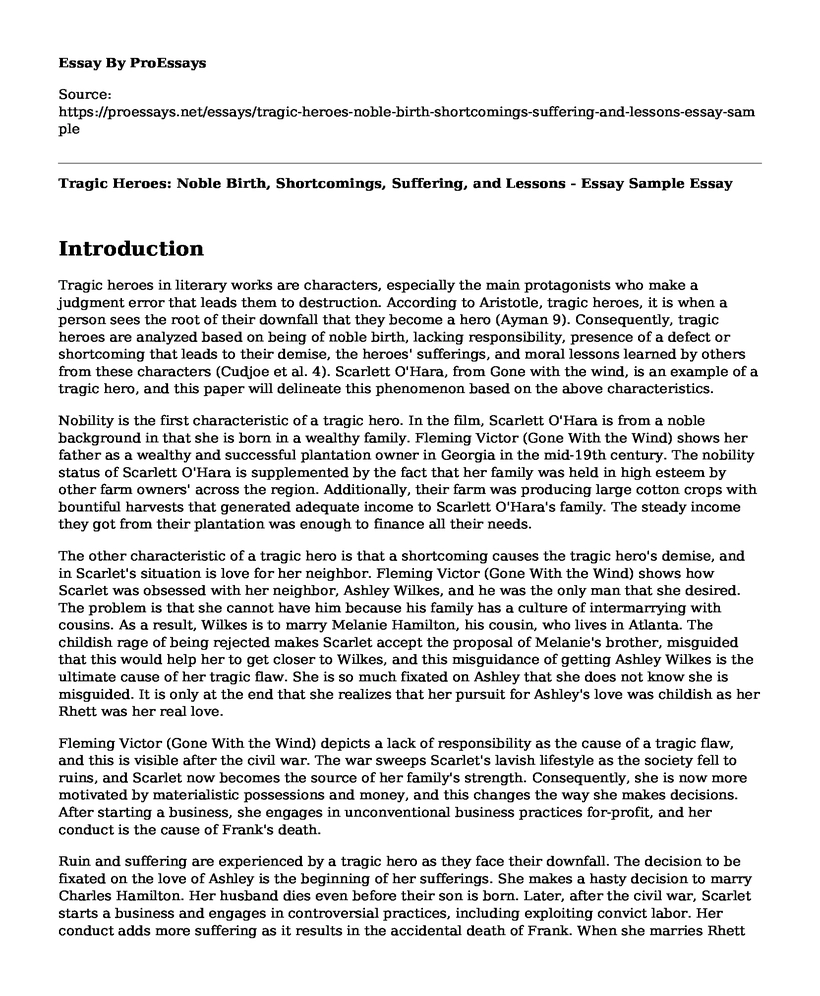Introduction
Tragic heroes in literary works are characters, especially the main protagonists who make a judgment error that leads them to destruction. According to Aristotle, tragic heroes, it is when a person sees the root of their downfall that they become a hero (Ayman 9). Consequently, tragic heroes are analyzed based on being of noble birth, lacking responsibility, presence of a defect or shortcoming that leads to their demise, the heroes' sufferings, and moral lessons learned by others from these characters (Cudjoe et al. 4). Scarlett O'Hara, from Gone with the wind, is an example of a tragic hero, and this paper will delineate this phenomenon based on the above characteristics.
Nobility is the first characteristic of a tragic hero. In the film, Scarlett O'Hara is from a noble background in that she is born in a wealthy family. Fleming Victor (Gone With the Wind) shows her father as a wealthy and successful plantation owner in Georgia in the mid-19th century. The nobility status of Scarlett O'Hara is supplemented by the fact that her family was held in high esteem by other farm owners' across the region. Additionally, their farm was producing large cotton crops with bountiful harvests that generated adequate income to Scarlett O'Hara's family. The steady income they got from their plantation was enough to finance all their needs.
The other characteristic of a tragic hero is that a shortcoming causes the tragic hero's demise, and in Scarlet's situation is love for her neighbor. Fleming Victor (Gone With the Wind) shows how Scarlet was obsessed with her neighbor, Ashley Wilkes, and he was the only man that she desired. The problem is that she cannot have him because his family has a culture of intermarrying with cousins. As a result, Wilkes is to marry Melanie Hamilton, his cousin, who lives in Atlanta. The childish rage of being rejected makes Scarlet accept the proposal of Melanie's brother, misguided that this would help her to get closer to Wilkes, and this misguidance of getting Ashley Wilkes is the ultimate cause of her tragic flaw. She is so much fixated on Ashley that she does not know she is misguided. It is only at the end that she realizes that her pursuit for Ashley's love was childish as her Rhett was her real love.
Fleming Victor (Gone With the Wind) depicts a lack of responsibility as the cause of a tragic flaw, and this is visible after the civil war. The war sweeps Scarlet's lavish lifestyle as the society fell to ruins, and Scarlet now becomes the source of her family's strength. Consequently, she is now more motivated by materialistic possessions and money, and this changes the way she makes decisions. After starting a business, she engages in unconventional business practices for-profit, and her conduct is the cause of Frank's death.
Ruin and suffering are experienced by a tragic hero as they face their downfall. The decision to be fixated on the love of Ashley is the beginning of her sufferings. She makes a hasty decision to marry Charles Hamilton. Her husband dies even before their son is born. Later, after the civil war, Scarlet starts a business and engages in controversial practices, including exploiting convict labor. Her conduct adds more suffering as it results in the accidental death of Frank. When she marries Rhett Butler for money, their daughter, Eugenia Victoria, dies in a riding accident. To worsen the situation s makes Rhett lose hope in her, and therefore she ends up losing him.
The last characteristic of a tragic hero is the existence of a moral lesson that others can learn (Cudjoe et al. 5). People watching the film can learn that it is not a must that they achieve what they desire in their lives, and therefore they should know the limit and time to quit. Scarlet loves Ashley, but she should have understood that she could not have him because he was married to Melanie. It is the obsession that she had that brought her much suffering through her life.
Work Cited
Ayman, Bassant. "The Tragic Hero between Aristotle and Miller". The Classical Weekly, vol 6, no. 1, 2016, p. 9, doi:10.13140/RG.2.2.27492.83849.
Cudjoe, RV et al. "The Fall of the Tragic Hero: A Critique of the Hubristic Principle". UJAH: Unizik Journal of Arts and Humanities, vol 12, no. 1, 2011. African Journals Online (AJOL), doi:10.4314/ujah.v12i1.1.
Fleming, Victor, director. Gone With the Wind (1939). Box Office, 1940.
Cite this page
Tragic Heroes: Noble Birth, Shortcomings, Suffering, and Lessons - Essay Sample. (2023, Jul 21). Retrieved from https://proessays.net/essays/tragic-heroes-noble-birth-shortcomings-suffering-and-lessons-essay-sample
If you are the original author of this essay and no longer wish to have it published on the ProEssays website, please click below to request its removal:
- Critical Essay on Pride and Prejudice
- Essay on Use of Allegory to Convey a Morality Message
- Literary Analysis Essay on The E-Myth
- Essay Sample on Symbolism White Teeth by Zadie Smith
- Essay Example on The Self: Avocado & Artichoke Philosophies
- Essay Example on Ode on a Grecian Urn: Capturing Life in Its Fullest
- Ethics of Information Technology: Balancing Surveillance, Privacy, and Social Welfare - Paper Example







